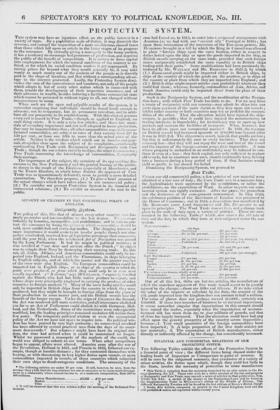PROTECTIVE SYSTEM.
THIS system may have an injurious effect on the public interest in a variety of ways. By a prghibitive scale of duties, it may diminish the revenue, and compel the imposition of a more mischievous class of taxes than those which fall upon an article in the latter stages of its progress to the consumer. By virtually. giving a monopoly to the home market, it has a tendency to encourage bad processes of production, and deprives the public of the benefit of competition. It is certain to force capital into employments for which the natural condition of the country is un- fitted, or for which its social condition renders it yet unprepared. By raising prices far beyond what they would naturally be, it may take nearly as much money out of the pockets of the people as is directly paid in the shape of taxation, and that without a corresponding advan- tage to the interest protected. Lastly, the Protective System dimi- nishes the sum of the conveniences and comforts, not only of the people which adopts it, but of every other nation which is connected with them, retards the development of their respective resources, and of their advances in wealth, besides inducing a factitious commercial state which cannot be persisted in without injury to rill, nor changed without inconvenience to many. When such are the open and palpable results of the system, it is somewhat surprising that individuals should be found hardy enough to advocate, not its temporary, . but its permanent retention, and to attri- bute all our prosperity to its establishment. With this class of persons every evil is traced to Free Trade,-though, as applied to England, no such thing exists. It is only a very few articles, and those raw mate- rials of secondary importance and not well adapted to home production, that may be imported duty-free ; all other commodities, espevia I ly wuu u - factured commodities, arc subject to rates of duty varying from 201. to 150 per cent., or from one fifth to more than the actual price of the article. Neither is the wisdom which cricth out in taverns and jour- nals altogether clear upon the subject of its complaints,-continually confounding Free Trade with Reciprocity and Reciprocity with Free Trade ; though the one relates entirely to ships, the other to commerce; Free Trade concerning the interchange of commodities, Iteciprocity their carriage.
The importance of the subject, the certainty of its approaching dis- cussion in the New Parliament, and the general leaning of the public, as shown in the result of the Elections (especially at Manchester, and at the Tower Hamlets, in which latter district the opponent of Free Trade was so ignominiously defeated), seem to justify a more detailed examination. We therefore propose, (1.) To give a brief account of the actual changes which have taken place in our commercial policy ; (2.) To consider our present Protective System in its financial and commercial relations ; (3.) To (2:d:ilia an account of its cost to the public.


























 Previous page
Previous page